


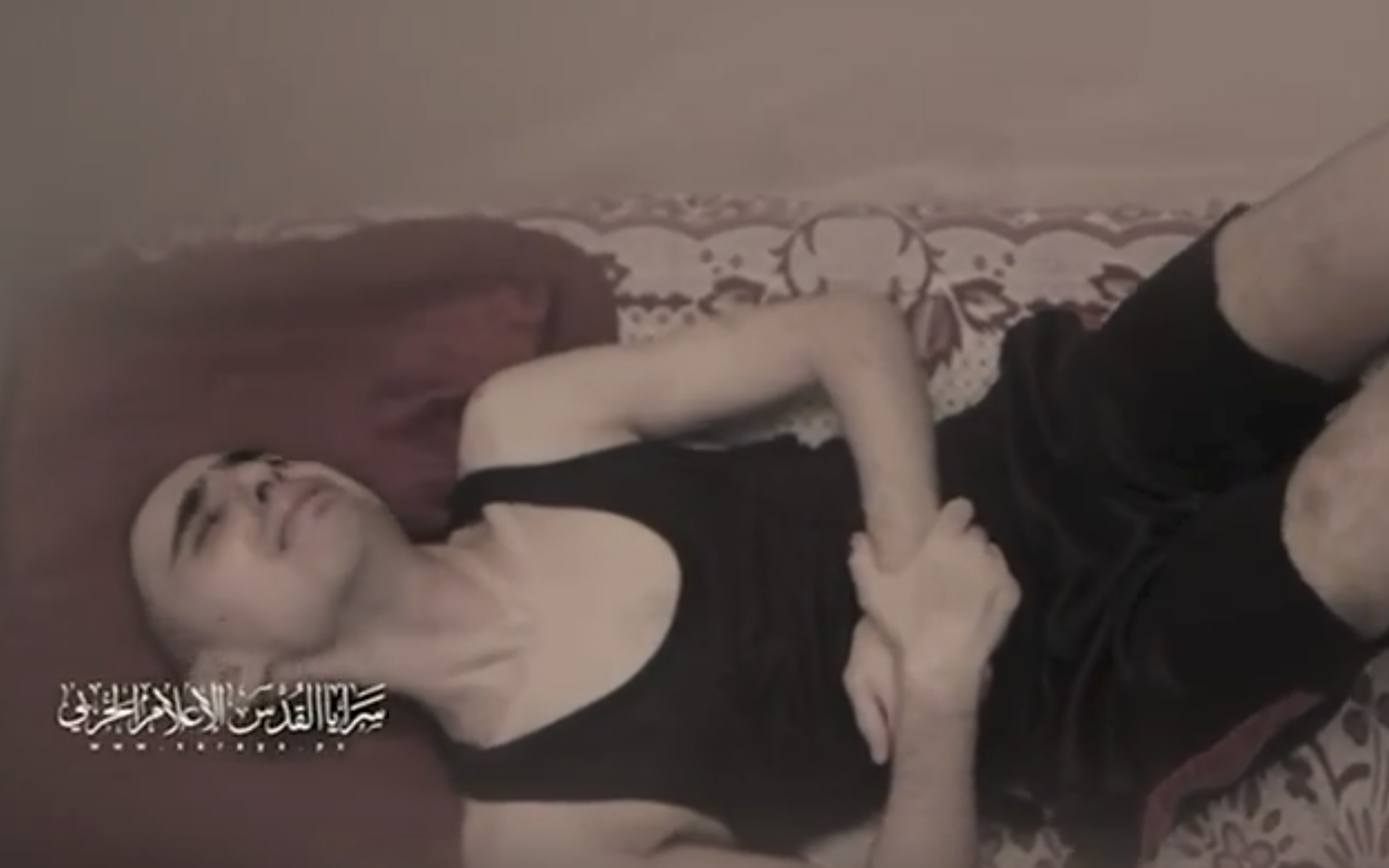
The family of hostage Rom Braslavski said on Sunday that it was allowing the publication of part of a propaganda video released by the Palestinian Islamic Jihad terror group last week showing him emaciated and begging for freedom.
In the clip, Braslavski, in tears, says he is “suffering with pain that doesn’t look good,” and that he is unable to stand or walk.
“I don’t have any more food or water. Before they would give me a little bit, today there is nothing,” he said, adding that he ate “three crumbs of falafel” that day, and a day earlier “barely a plate of rice.”
“I can’t sleep, I can’t live, you have to stop what you’re doing here,” he continued. “I am at death’s door, and I’m sure that all the other [hostages] are in the same mental state.”
After it released the clip on Thursday, PIJ claimed that the six-minute video was recorded days before it lost contact with the captors holding Braslavski, and alleged that the hostage’s fate was unknown.
PIJ has made statements and claims in the past that have not always proven reliable. Israel has accused the group, like Hamas, of waging psychological warfare with its videos and statements regarding the hostages. PIJ released a video of Braslavski in April, likely scripted by his captors, in which he said he was experiencing “hell” and displayed signs of illness.
Hamas on Friday released a propaganda video of Evyatar David, which was approved by the family a day later. The video showed David, severely pale and emaciated, digging what he says he fears will be his own grave.
In a statement shared by the Hostages Families Forum, Braslavski’s mother, Tami, said that the video shows “the nightmare I was only afraid to imagine is real. The fear we live with has become more tangible than ever, and it’s important that the whole world sees this, despite my personal difficulty in publicly showing my Rom in the dire condition he’s in.”
She said that she has “never seen my son like this. Rom is not shouting or angry — he speaks quietly, in a weak voice like a person who has accepted the fact that there’s nothing left to fight for and he may not come out of there alive.”
She added: “My Rom, I look into your eyes and see the disappointment, your heartbreak. I listen to your voice and hear the pain. I don’t know what will happen, but I am doing and will do everything to get you out of there, and I won’t stop until you come home.”
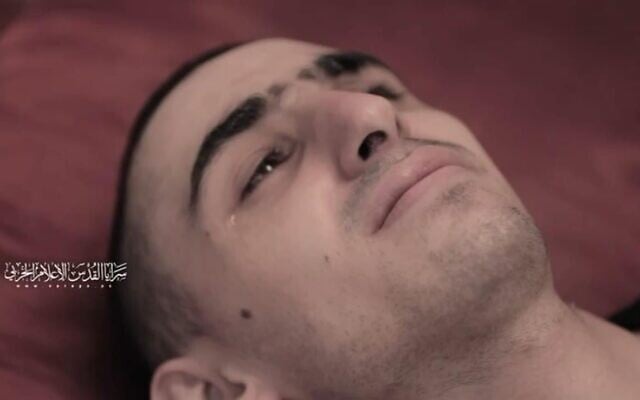
Braslavski’s father, Ofir, told Channel 12 news after it screened the video excerpt: “What can I say? He’s dying. You’re watching your son dying before your eyes and there’s nothing you can do.”
He said that the previous video released of Rom “was also hard to take. But he still had hope in his eyes. Now, he’s apparently lost that. He doesn’t want to live.” Ofir said that “it’s not just hunger… they’re torturing him… there’s no time left… he’ll die soon.”
Ofir said that he spoke to Prime Minister Benjamin Netanyahu the previous day. “I told him, he’s dying and… to stop everything… and give [Hamas] what they want, to get the hostages out,” he said, adding that Netanyahu had told him he was doing everything, but “I don’t buy it… The fact is that there’s no progress.”
Thursday’s video of Braslavski was the second released by PIJ, over 22 months since the off-duty soldier, a resident of Jerusalem, was abducted from the Nova music festival, where he was working as a security guard. His family has shared testimonies from partygoers that Braslavski rescued them amid the onslaught.
Braslavski is one of the 49 hostages kidnapped during the October 7, 2023, massacre that are still being held captive in Gaza. Only 20 of the captives are thought to be alive. Hamas is also holding the body of a soldier who was killed in 2014.
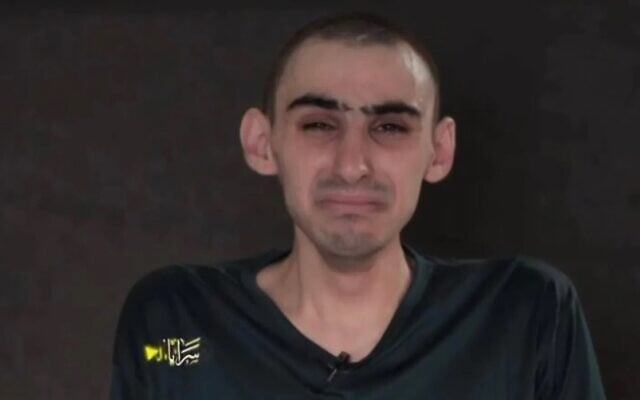
Speaking Sunday evening in a video message shared by his office, Netanyahu said the videos of the two severely emaciated hostages in Gaza proved that Hamas has no interest in reaching a hostage release deal, and that the footage has strengthened his resolve to “eliminate” the terror group.
After viewing the videos of hostages Braslavski and David, Netanyahu said, “I understand exactly what Hamas wants. It doesn’t want a deal. It wants to break us — with these horrifying videos, with the false horror propaganda it spreads across the world.”
Addressing the Israeli public, the premier said he was “shocked” by “the horrifying videos,” after which he spoke with the hostages’ families, adding that while hostages are “wasting away in a dungeon…the Hamas monsters surrounding them — they have thick, fleshy arms. They have everything they need to eat. They are starving them the way the Nazis starved the Jews.”
“But we will not break,” he continued, adding: “I am filled with even greater determination to free our captive sons, to eliminate Hamas and to ensure that Gaza will never again pose a threat to Israel.”
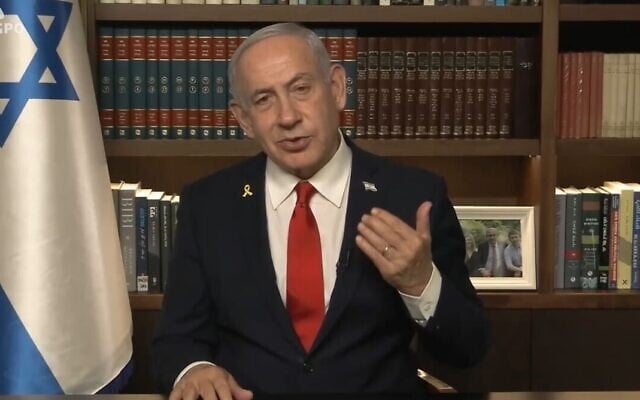
Earlier Sunday, Netanyahu urged the International Committee of the Red Cross to take immediate action to provide food and medical care to the hostages during a conversation with Julien Lerisson, head of the Red Cross delegation in the region.
After the call, the ICRC said that hostages being held in Gaza “must urgently receive the medical care and attention they require” and reiterated its call to be allowed access.
In a statement, the ICRC said that it is “appalled by the harrowing videos published over the last few days of Israeli hostages held in captivity in Gaza.”
“These videos are stark evidence of the life-threatening conditions in which the hostages are being held,” the statement added. “We know families watching these videos are horrified and heartbroken by the conditions they see their loved ones held in.”
The hostages must be “afforded humane treatment and acceptable conditions. They must urgently receive the medical care and attention they require,” the ICRC added. “As long as hostages remain in captivity, we stand ready to fulfill our role as a neutral humanitarian intermediary, and to facilitate the release of all the hostages at any stage.
“We also reiterate our call to be granted access to the hostages, so we can assess their condition, give them medical support and facilitate contact with their families,” the ICRC said.
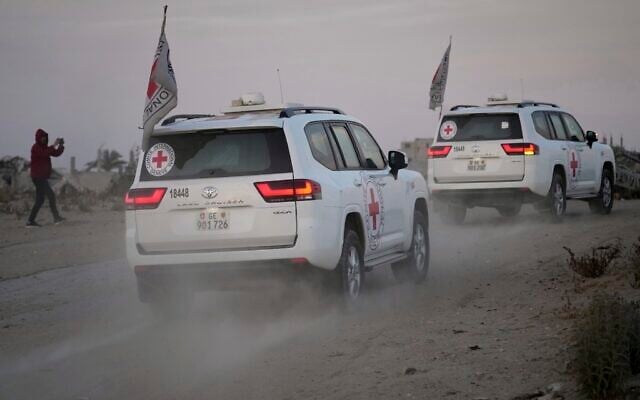
The Red Cross has not been allowed any access to the hostages during 22 months of war, and has faced heavy criticism from Israel and Jewish groups over its failure to secure such access. The organization, which says it must maintain neutrality to operate in war zones, facilitated the release of Israeli and other foreign hostages in November 2023 and again in January-February 2025.
Responding to the ICRC’s statement, the Al-Qassam Brigades, the military wing of Hamas said it is “prepared to positively engage and respond to any request by the Red Cross to bring food and medicine” to the hostages it is holding, which the terror group refers to as “enemy prisoners,” if Israel opens up humanitarian aid corridors.
The group’s spokesman Hudhaifa Kahlout, known by the nom de guerre Abu Obeida, said the terror group is conditioning the Red Cross’s access to the hostages “on the opening of humanitarian corridors in a normal and permanent manner for the passage of food and medicine to all our people in all areas of the Gaza Strip, and the cessation of all forms of enemy aerial activity during the times of parcel deliveries to the prisoners.”
“The Al-Qassam Brigades do not deliberately starve the prisoners, but they eat what our mujahideen (fighters) and the general public eat, and they will not receive any special privilege amid the crime of starvation and siege,” he added.
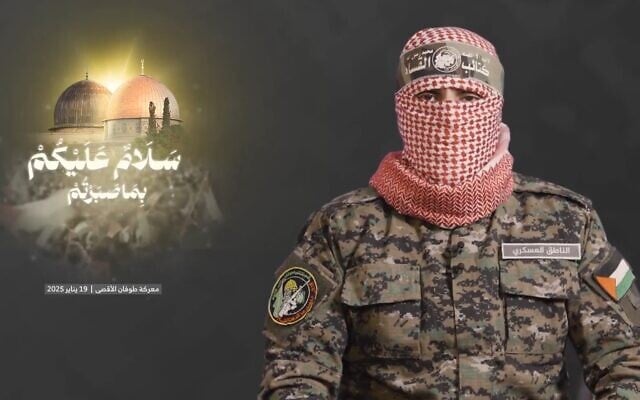
Israel denies reports of widespread starvation in the Strip and has blamed the United Nations and Hamas for impeding and hijacking aid deliveries, respectively.
According to Gaza’s Hamas-run health ministry, the total number of malnutrition-related deaths in the Strip stands at 175, including 93 children, since the war in Gaza began. The World Health Organization reported 63 malnutrition-related deaths in Gaza in July alone, including 25 children of whom all but one was under the age of 5.
Hamas death tolls cannot be independently verified.
Last week, Israel announced 10-hour humanitarian pauses in populated areas of the Strip and greatly boosted aid entering Gaza. It is not immediately clear if the terms set out by Hamas are feasible for Israel.
